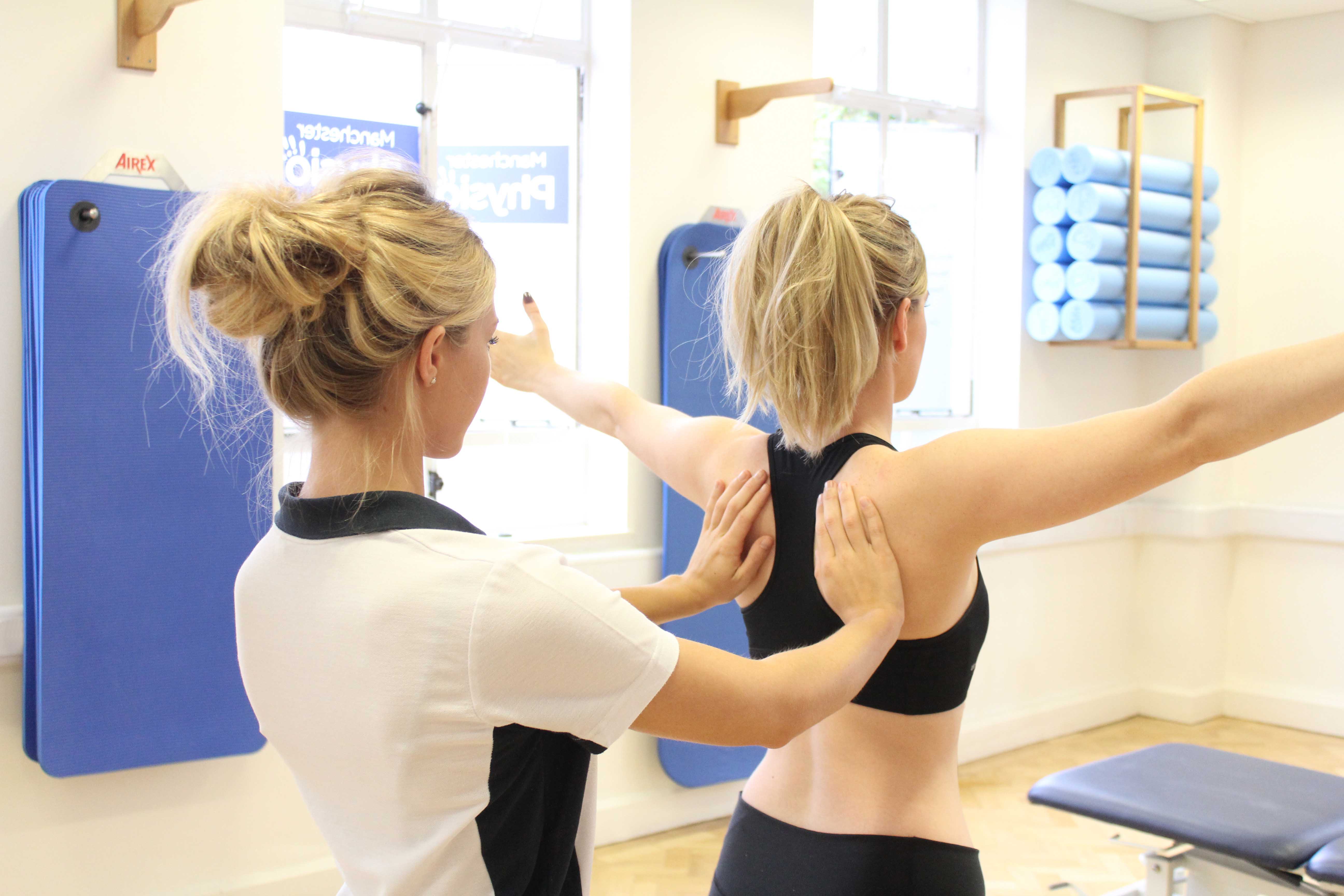- Acromio-clavicular ligaments
- Coraco-clavicular (CC) ligaments
 Above: Scapular stabilisation exercises supervised by therapist
Above: Scapular stabilisation exercises supervised by therapistWhen you fall onto the point of your shoulder, the impact forces your shoulder downwards while your clavicle remains fixed. The ligaments which hold your AC joint in place are torn and your clavicle appears prominent under the skin. Your AC injury is classified in one of six categories which indicate the severity of the dislocation, the direction of dislocation and whether surgery is required. These are:
- Grade I – mild sprain on your AC ligament
- Grade II – AC ligament torn only
- Grade III – both your AC and CC ligaments are torn
- Grade IV –both your AC and CC ligaments are torn and your clavicle is displaced backwards
- Grade V – a severe upward displacement of the clavicle
- Grade VI–a downward displacement of the clavicle
- Modified Weaver-Dunn (Open or Arthroscopy)
- Surgilig Procedure
 Above: Mobilisation of the shoulder joints and connective tissues
Above: Mobilisation of the shoulder joints and connective tissuesPhysiotherapy prior to AC joint Stabilisation
Physiotherapy before surgery is a useful and highly recommended treatment.Physiotherapy prior to surgery is regularly recommended and successful in rehabilitation for less severe dislocations(Grades I-III). Physio.co.uk will to help manage symptoms, prevent future problems and rehabilitate your shoulder back to its normal functional ability. Pre-surgical physiotherapy will also provide a solid platform to commence rehabilitation post surgery which will ultimately reduce rehab time. Treatments offered include:
|
Acute management of symptoms |
- Postural education
- Strengthening programme
- Soft tissue massage
- Stretching
- Advice and education on surgery and function
Symptoms following AC Joint Stabilisation
Following your AC joint stabilisation surgeryyour shoulder will be placed in a protective sling for 6 weeks to provide support for the vulnerable shoulder and help aid recovery. Common symptoms that are normal for you to experience include:
- Pain
- Swelling
- Bruising
- Stiffness
- Numbness (following anaesthesia – this will subside)
Physiotherapy following AC Joint Stabilisation
Following AC joint stabilisation it is essential to have physiotherapy to help manage your symptoms and rehabilitate your shoulder back to its normal, functional use. Physio.co.uk will compile a thorough assessment highlighting specific areas which need to be treated. We will then design and implement a comprehensive rehabilitation programme focussing on specific needs and future personal goals.
Weeks 1-3
Initial treatment will centre on preventing post operative complications, managing acute symptoms and early mobilisation. Scapular control exercises are hugely important in AC joint rehabilitation. Scapular control is essential for accurate, controlled movement of the arm throughout its entire range. Without this control, it can lead to secondary problems including impingement, tendinopathies and instability. Treatment through Physio.co.uk will include:
- Cryotherapy
- Pain management
- Reciprocal inhibition
- Pendular exercises
- Active assisted range of movement exercises below shoulder height
- Elbow, wrist and hand range of movement and strengthening exercises
- Postural education
- Scapular stability
- Sling management
- Home exercises
- Advice and education
Weeks 4-6
Physio.co.uk will continue to focus on scapular stability and range of movement exercises to correct biomechanical movement, therefore preventing secondary problems, and prevent contractures. Treatment willinclude:
- Increase active range of movement within safe range (0-90 degrees)
- Improve strength
- Progression of scapular stability exercises
- Progressive weaning off sling – help improve mobility and functional independence
Weeks 6-12
Following 6 weeks of treatment with Physio.co.uk you will be weaned off your sling and permitted to intensify rehabilitation. You will be allowed to actively begin to move your arm and commence strengthening work of your shoulder musculature. Our target will be to provide full range of movement by week 12 and begin to include occupational and sport specific exercises into rehabilitation. Treatment will include:
- Active, active-assisted and passive range of movement exercises to achieve full range
- Soft Tissue Massage
- Isolated strength work – muscle hypertrophy
- Rotator cuff strengthening
- Scapular stability throughout range
- Proprioceptive training
- Stretching
- Home exercise programme
- Joint mobilisations
- Muscular endurance
- Cardiovascular fitness
- Begin occupational and sport specific exercises
Weeks 12+
Following 12 weeks of physiotherapy you will have made significant improvement in movement, strength and function. With full recovery taking up to 6 months Physio.co.uk will continue to intensify rehabilitation in order for you to meet your personal goals. Focus will be on the co-ordination of skilled, physically demanding movements so that your shoulder is protected from future problems and returns to its optimal function. Treatment will include:
- Advanced strengthening in unsafe zones (end range limits)
- Advanced core stability exercises
- Advanced proprioceptive exercises
- Plyometric exercises
- Sports specific activities
- Functional training
- Advice on long term management
Summary
AC joint stabilisation is a common surgical procedure performed when you have dislocated your shoulder. AC dislocation is usually a result of direct trauma to the shoulder which results in torn ligaments and a displacement of the clavicle. When these ligaments are severely damaged, AC stabilisation surgery is recommended to re-align the joint and re-attach the ligaments. Following surgery, physiotherapy is essential in order to fully rehabilitate the shoulder allowing you to return to functional independence. Physio.co.uk will develop a comprehensive rehabilitation programme developed around specific goals with focus on returning normal movement strength and function. Call Physio.co.uk now on 0330 088 7800 for more information or to book an appointment please contact us.

 0330 088 7800
0330 088 7800





































